高考英语单项选择题讲练课件
文档属性
| 名称 | 高考英语单项选择题讲练课件 |  | |
| 格式 | zip | ||
| 文件大小 | 281.5KB | ||
| 资源类型 | 教案 | ||
| 版本资源 | 人教版(新课程标准) | ||
| 科目 | 英语 | ||
| 更新时间 | 2017-09-20 16:19:22 | ||
图片预览




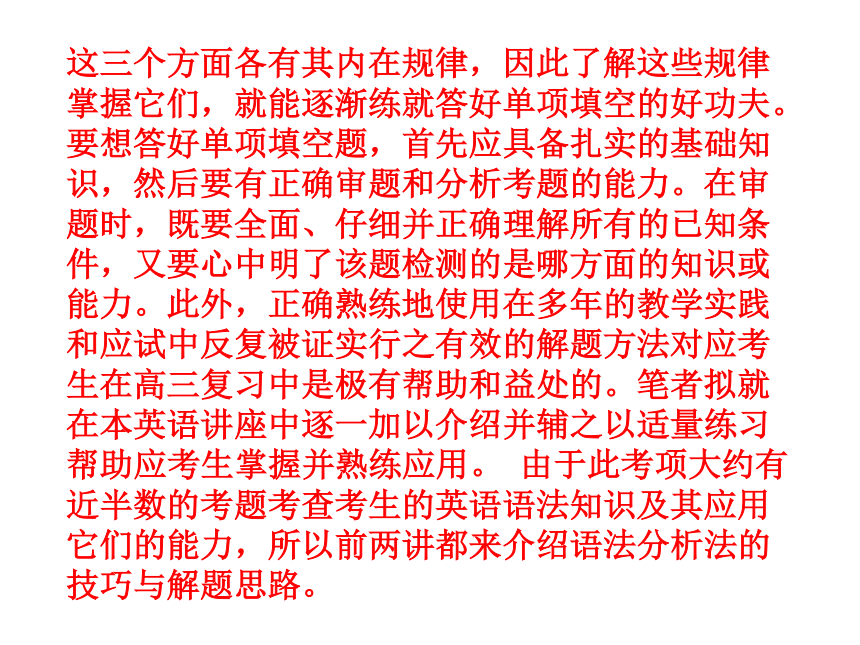


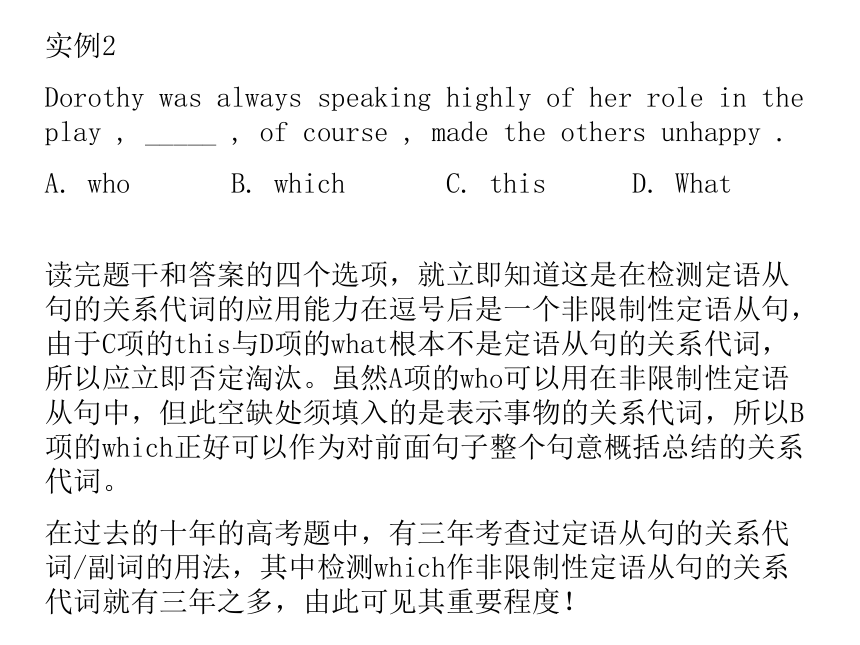
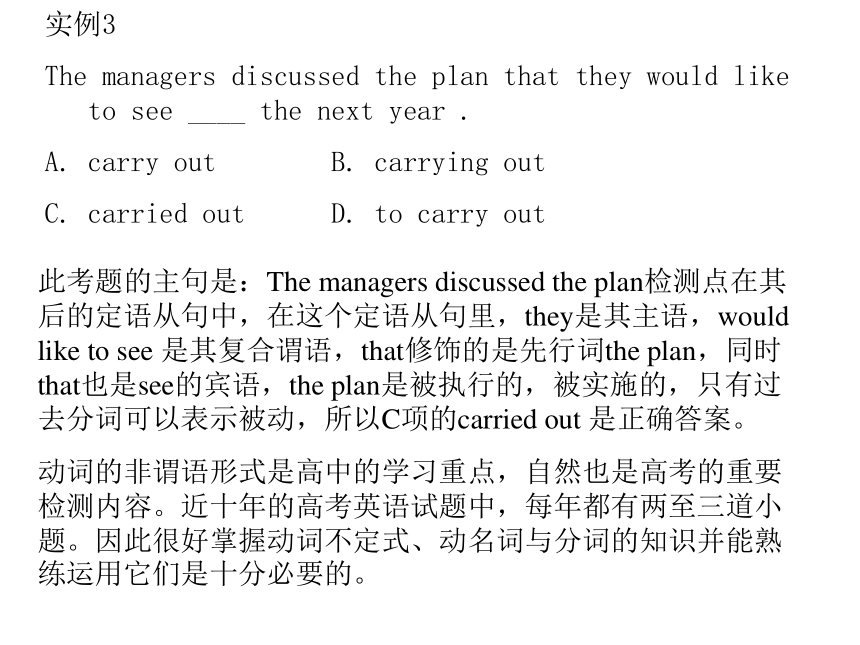
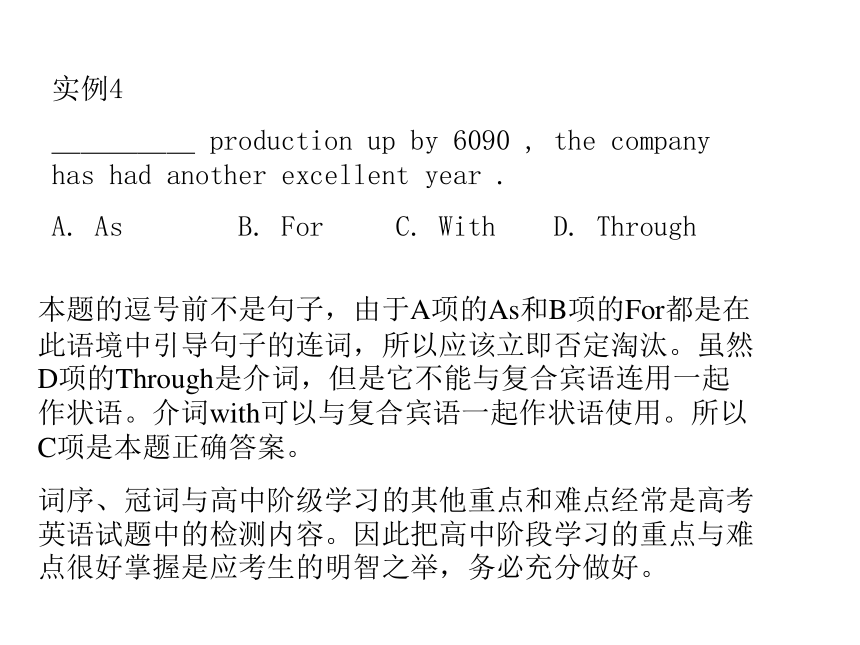
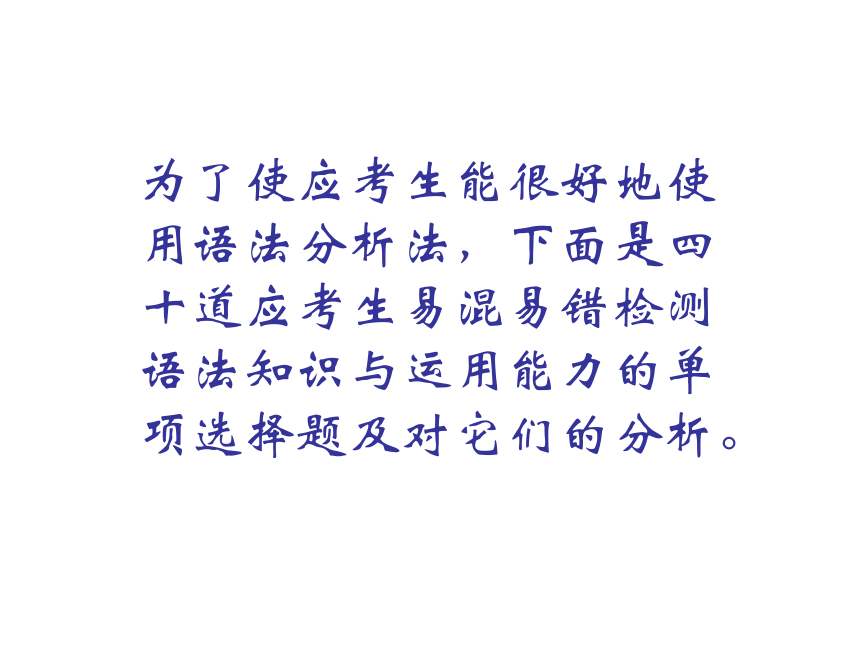
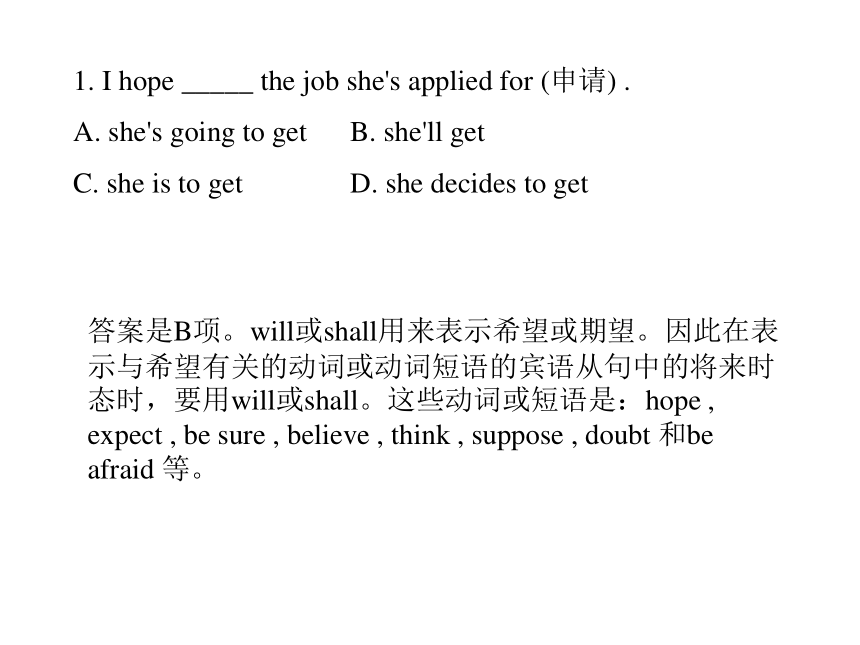
文档简介
课件52张PPT。The golden age is before us , not behind us . Mark Twain , American writer
高考英语单项选择题讲练课件学英语如高山流水居高临下高三英语单项选择题讲练单项填空这个考项集中考查以下三个方面:
1. 英语语法知识及其应用;
2. 对近义词或习惯用语的辨析;
3. 日常交际用语在具体语言情 景中的正确应用。
这三个方面各有其内在规律,因此了解这些规律掌握它们,就能逐渐练就答好单项填空的好功夫。 要想答好单项填空题,首先应具备扎实的基础知识,然后要有正确审题和分析考题的能力。在审题时,既要全面、仔细并正确理解所有的已知条件,又要心中明了该题检测的是哪方面的知识或能力。此外,正确熟练地使用在多年的教学实践和应试中反复被证实行之有效的解题方法对应考生在高三复习中是极有帮助和益处的。笔者拟就在本英语讲座中逐一加以介绍并辅之以适量练习帮助应考生掌握并熟练应用。 由于此考项大约有近半数的考题考查考生的英语语法知识及其应用它们的能力,所以前两讲都来介绍语法分析法的技巧与解题思路。
高考英语试题的典型实例的阐述:
实例1
-How are you today ?
-Oh , I _____ as ill as I do now for a very long time .
A. did not feel B. was not feeling C. do not feel D. have not felt
尽管不读题干,光看答案的四个选项,就可以毫不迟疑地判断出此题考查的是动词的时态的知识,因为四个选项是feel这个动词不同的四个时态的否定形式,读完题干,我们清楚得知此对话的语言情景。前者说:今天你感觉如何?后者答:我好长一段时间里没像现在感觉这么难受。题干中有as I do now这个一般现在时的动词形式,那么空缺的谓语动词肯定与现在时有关,所以A项的did not feel 或B项was not feeling这两个过去时态的动词形式立即就被否定淘汰。由于句意,尤其是其后的for a long time这一往往与现在完成时连用的时间状语,就帮助我确定此题正确答案是D项的have not felt这一现在完成时的否定形式。
单项填空考项中总以检测动词时态在具体的语境中的应用为重点,因此必须要真正掌握好动词的时态的知识。
实例2
Dorothy was always speaking highly of her role in the play , _____ , of course , made the others unhappy .
A. who B. which C. this D. What
读完题干和答案的四个选项,就立即知道这是在检测定语从句的关系代词的应用能力在逗号后是一个非限制性定语从句,由于C项的this与D项的what根本不是定语从句的关系代词,所以应立即否定淘汰。虽然A项的who可以用在非限制性定语从句中,但此空缺处须填入的是表示事物的关系代词,所以B项的which正好可以作为对前面句子整个句意概括总结的关系代词。
在过去的十年的高考题中,有三年考查过定语从句的关系代词/副词的用法,其中检测which作非限制性定语从句的关系代词就有三年之多,由此可见其重要程度!
此考题的主句是:The managers discussed the plan检测点在其后的定语从句中,在这个定语从句里,they是其主语,would like to see 是其复合谓语,that修饰的是先行词the plan,同时that也是see的宾语,the plan是被执行的,被实施的,只有过去分词可以表示被动,所以C项的carried out 是正确答案。
动词的非谓语形式是高中的学习重点,自然也是高考的重要检测内容。近十年的高考英语试题中,每年都有两至三道小题。因此很好掌握动词不定式、动名词与分词的知识并能熟练运用它们是十分必要的。
实例3
The managers discussed the plan that they would like to see ____ the next year .
carry out B. carrying out
C. carried out D. to carry out
本题的逗号前不是句子,由于A项的As和B项的For都是在此语境中引导句子的连词,所以应该立即否定淘汰。虽然D项的Through是介词,但是它不能与复合宾语连用一起作状语。介词with可以与复合宾语一起作状语使用。所以C项是本题正确答案。
词序、冠词与高中阶级学习的其他重点和难点经常是高考英语试题中的检测内容。因此把高中阶段学习的重点与难点很好掌握是应考生的明智之举,务必充分做好。
实例4
_____ production up by 6090 , the company has had another excellent year .
A. As B. For C. With D. Through
为了使应考生能很好地使用语法分析法,下面是四十道应考生易混易错检测语法知识与运用能力的单项选择题及对它们的分析。
1. I hope _____ the job she's applied for (申请) .
A. she's going to get B. she'll get
C. she is to get D. she decides to get
答案是B项。will或shall用来表示希望或期望。因此在表示与希望有关的动词或动词短语的宾语从句中的将来时态时,要用will或shall。这些动词或短语是:hope , expect , be sure , believe , think , suppose , doubt 和be afraid 等。
2. There must be _____ book which could help .
A. some B. any C. one D. one useful
答案是A项。some除了用作数量词外,还可用来泛指未知的人或事物。又如:There must be some reason for what he has done . (他所做的事肯定基于某种原因。)
3. If you _____ stop smoking , you can only expect to have a bad cough .
A. won't B. would not C. do not D. can not
答案是A项。will除了用作表示将来时的助动词外,还可用来强调愿意或不愿意。又如: If you will would wait a moment , I will fetch the money . (如果你肯/愿意稍等片刻,我就把钱取来。)但是在表示不肯或不愿意时,则只能使用won't,不能使用would not。
4. Take a taxi , _____ you'll miss your train .
A. and B. if C. otherwise D. or
答案是C项。祈使句可用来取代if从句来表示评论、提出要求、发出忠告或威胁等。用祈使句比用if从句表达更强的紧迫性。在表示评论和要求时,其连词用and,表示忠告时用连词otherwise,表示威胁时,用连词or。例如:Fail to pay and they will cut off the electricity . (不交钱,他们就会中断供电。)这是客观的评论;Tell us what to do and we will get on with it . (如果你告诉我们该做些什么,我们就会把它做好。)这明显是请求;Put on you overcoat when you go out , otherwise you will catch cold . (外出时你应该穿上大衣,不然的话你会感冒的。)显然这是忠告;Drop that gun , or I will shoot you . (把枪放下,否则我就开枪打死你。)很明显,这是威胁。
5. I posted the letter some time _____ the week .
A. in B. during C. throughout D. within
答案是B项。介词during后面总是一个表示时间的名词,这一句词可以指整段时间,如:It was very cold during the winter (整个冬天,天气都很严寒。)这一名词也可以指一段时间中的时点或时刻,如:She has phoned him four times during the last half an hour . (在刚才的半个小时内,她给他打过四次电话。)在这个例句里during可以被介词in代替,因为in具有within a period (在一段时间内)的意思。但在以下两种情况下不能用in代替during。(1)当所提及的是一个事件或一项活动,而不是一段时间时,如:I didn't learn much during my teacher training . (在教师培训中,我没学到多少东西。);(2)在表示不明确的时间时,用some time + during…表示,如:I dropped in on him some time during my visit the city . (在我观光那座城市时,我曾顺便看望过他。)
6. I'd better not catch ______ that again !
A. your doing B. you doing
C. you to do D. you being doing
答案是B项。如同感观动词一样,下面这些动词后只能跟代词的宾格或名词的通格(如him , Mary),其后是"动词-ing":start , keep , stop , catch , find , leave , 如:When are you going to start him working for us ? (你打算什么时候让他开始为我们工作?)。应该指出感观动词后的宾语既可跟着"动词-ing"形式,又可跟着不带to动词不定式,但以上这些动词后总跟着宾语+动词-ing的形式。7. I couldn't have got to the meeting on time - _______ an earlier train .
A. if I had not caught B. unless I had caught
C. if I did not catch D. unless I caught
答案是B项。if…not和unless有时可以互相替换,但也有不能互相替换的时候。unless用于这样的句子,即"如果A不受阻于B,A将发生",例如:He will accept the job if the salary is not too low / unless the salary is too low . (如果薪水不太低,他就会接受这一工作/除非薪水太低,否则他会接受这一项工作的。)但是unless不能用于"由于未发生B而发生A"的句子里,如:I will be quite glad if she does not come this evening (她今天晚上要是不来,我才高兴呢。)又如:I will be surprised if he does not win the game next week . (如果他赢不了下星期那场比赛,我倒会感到惊奇的。)在以上的两个句子中不能使用unless,但是unless常用来引导一个谈及过去的事后的想法,unless从句跟着主句,通常用破折号而不是逗号将它与主句分开。第7题的句意是:我不可能准时到会了-除非我当时赶上更早一列火车。这个句子的实际是说:我没有准时到会。我只有赶上更早的一趟火车,才能准时到会。如果用if … not代替上面句中的unless,那么这个句子就变成:I couldn't have got to the meeting on time if I hadn't caught an earlier train . (要不是我赶上了更早的一班火车,我就不可能准时到会。)这句话表达的意思与上句完全相反:我确实准时到会了,因为我赶上了更早的一趟火车。
8. I'll have you ______ English in six months .
A. speaking B. speak
C. spoken D. be able to speak
答案是A项。"have +宾语+doing"这一结构有以下五种用法。(1)用来表示我们一心要取得的效果,如:He promised to have me swimming across the river in two weeks' time . (他答应在两周之内使我能游过那条河。);(2)用来表示使宾语持续做某事,如:In cold winter we always have the fire burning day and night . (在冬天,我们总是让火日以继夜地燃烧着。);(3)用来表示不想发生的后果,如:Don't shout ! You will have the neighbors complaining ! (别大声嚷嚷!你会使邻居有意见的!);(4)用来表示说话人控制不了的情况,如:We have salesmen or saleswomen calling every day . (我们每天都得任凭推销员们的造访。);(5)这一结构前如用can not 或won't,则表示"不能/愿容忍"宾语做某事,如:I won't / can not have you speaking like that about your father . (我不允许/不能容忍你那样无礼貌地谈论你自己的父亲。)
9. Our decision _____ was wise .
A. of waiting B. to wait
C. for waiting D. to be waiting
答案是B项。英语中一些名词总与不定式连用,如:decision , wish 与 refusal等,使用这些名词与使用它们的动词形式表达的内容是一致的,请看下面三组例句:我们决定等待是明智的。
His wish to succeed is probable.
他希望成功,有可能。
Her refusal to help surprised us greatly.
她拒绝帮忙,使我们感到意外。
10. He's unlucky , and he's always suffering _____ luck one after another .
A. a sick B. an ill C. sick D. ill
答案是D项。英语中的名词有可数与不可数之分,luck是不可数名词,用来修饰贬意的luck形容词有bad,poor或ill,这时ill的词义是:不好的。
11. The news about the terrible flood there greatly discouraged ______ these for a sight-seeing .
A. us from going B. us to go
C. our going D. our to go
答案是A项。discourage与encourage互为反义词。英语中说"鼓励某人做某事"时使用encourage sb to do sth , 但如果要表示"使某人没勇气做某事"时,不能想当然的以此类推:discourage sb to do sth , 这是不符合英语习惯的错误表达方式,其正确形式是:discourage sb from doing sth 。
答案是D项。lose是个及物动词,如果要表示某物丢失了,只能用被动语态。A项与C项使用的都是其主动形式。missing是形容词,其词义是:lost ; not to be found (丢失了的),据此,第一空缺处应填入is missing。根据语境,第二个空缺处应填使用现在完成时的否定形式,因为它可以表示目前还未发生的动作。
12. My dictionary ________ . I have looked for it everywhere but still ______ it .
A. has lost ; do not find
B. is missing ; do not find
C. has lost ; have not found
D. is missing ; have not found
13. Shortly after the accident , two ______ police were sent to the spot to keep order .
A. dozens of B. dozens C. dozen of D. dozen
答案是D项。英语中一些表示数字的名词的前面如果用了数词,这些名词必须是单数形式,如dozen(一打),score(二十)和head (头) 等,例如:另外两打鸡蛋another two dozen eggs ; 八十七年前four score and seven years ago ; 五十五头牲口fifty-five head of cattle 。但是如果这些名词用来虚指某些可数名词时,这些名词呈复数形式,其后更加上介词of例如:dozens of pencils (几十支铅笔)和scores of tame birds (几十只家禽)。
14. Besides Tom , ______ Crosettes have two other sons , ______ of whom are all interested in making model planes .
不填;two B. 不填;the two
C. the ; three D. the ; the three
答案是D项。在英语的姓氏前使用定冠词,表示的是这个姓氏的一家人或这个姓氏的夫妇;"the + 数词 + of + 代词"这一结构表示该代词的总数是前面的数词表示的数量,而"数词+of+代词"结构中的代词表示的量肯定大于前面数词表示的数量,试比较:the five of us (我们这五个人,us表示的就是五个人)而five of us (我们中的五个人,us表示的数量肯定要多于五个人)。
15. Mr. Zhang gave all the textbooks to all the pupils , except _____ who had already taken them .
these B. ones
C.the ones D. the others
答案是C项。one本来是数词,但也可用作不定代词,代替前面刚提到的一个东西或人,避免重复前面刚提到的名词,有时one可以有自己的定语或冠词,甚至可以有复数形式,如:I don't like these pink shirts . Will you please show me the white ones ? (我不喜欢这些粉色的衬衣,请您把那些白色的衬衣拿给我看看好吗?)
16. ______ professional violinist practises for several hours a day , but ______ violinist has his own way of playing the Beethoven concert .
Each , every B. Every ; each
C. All ; every D. Either ; every
答案是B项。虽然every与each在汉语中的词意是:"每一个",但这两个代词的内涵不完全一样。every与all含义很接近,如:He has read every book / all books on the subject . (有关这个科目的书籍他全都读过了。)英文中常用every进行概括,强调事物或人的总体性,而each则表示个别概念,当我们说each violinist时,我们想到的是每个不同的人做着不同的事。又如:We want every child to succeed , however each child will find his or her own personal road to success . (我们希望每个孩子都能成功,然而每个孩子将会找到他或她个人的成功之路。)
17. The black horse is _____ of the pair .
A. the strongest B. the stronger
C. the strong D. quite strong
答案是B项。英语表示"两里择一的那一个更…"的名词前的比较级前面应该使用定冠词the。pair的词义是"一对"或"一双",此处的the pair 的词义是two horses fastened side by side to a cart (两匹套在车辕的马)。因此,此处应该使用the stronger 。
18. The duties of a policeman are _____ than ____ .
A. dangerouser ; a teacher
B. more dangerous ; a teacher
C. greater danger ; those of a teacher
D. more dangerous ; those of a teacher
答案是D项。英语中由构词法派生出的形容词或副词比较级与最高级一律前面加more各the most构成。dangerous是由danger派生出的形容词,因此其比较级是more dangerous ; 在比较句中,一定要使比较的东西是一致的。为了避免重复,需比较的对象如果是单数,应该使用that of…代替,如果需比较的对象是复数,则用those of …,请看以下两个例句,并理解上述说法:The climate in Florida is as mild as in California . (佛罗里达州的气候与加州的气候一样暖和。) Classes in universities are more difficult than those in colleges . (大学本科的课程比大学专科的课程更难。)19. It is a rule in his family that ______ comes home earlier should cook the dinner for the family .
A. Anybody B. who C. who that D. whoever
答案是D项。whoever有两个词义,(1)no matter who,在这种用法时引导一个让步状语从句,如:Whoever ( = No matter who ) it is , I do not want to see them . (无论他是谁,我都不想见。),又如:The business would be a success , whoever ( no matter who ) owned it . (这个企业准能兴旺发达,甭管谁是它的主人。);(2)anybody / that,在这种用法时,它连接一个名词性从句,在本题中它连的是主语从句,又如:I will take whoever ( anybody that ) wants to go to that beautiful park . (我要带任何想去那个美丽公园的人去那里。)在这一例句中whoever连接的是一个宾语从句。
20. I really wonder ______ he has posted me many parcels _____ we worked together .
A. how ; after B. why ; when
C. when ; before D. why ; since
答案是D项。英语中的连词since有这样的特性:终止其后从句中的延续性的谓语动词的动作。第二个空白处填入since之后,这个从句的意思是:自从我们不在一起工作起。此外,since还可使其后从句里的非延续性的谓语动词延续。例如:It is 15 years since he joined the Army . (他参军已经十五年了。)
21 . -How long _______ each other before they ________ married ?
-For about a year .
A. have they known ; get
B. did they know ; were going to get
C. do they know ; are going to get
D. had they known ; got
答案是D项。根据句意分析,他们结婚已是过去的事,那末,他们互相了解大约一年的时间肯定发生在结婚前,发生在过去某一动作之前的动作,应该使用过去完成时。
22. Michael ______ here to see you and he ______ a note on your desk .
A. has come ; has left
B. has been ; has left
C. has come ; left
D. has been ; left
答案是D项。此处的has been here表示"刚才到这儿来过",从字面上看这个表达方式是现在完成时,但实际上这个表达方式的内涵是该人已不在此处了。因此这个动作是发生在过去的事,那末该在你的书桌上留便条的动作也该用一般过去时。
23. -When ______ and visit our exhibition next month ? -When _______ , I will let you know .
A. will he come ; he will come
B. will he come ; he comes
C. does he come ; he will come
D. does he come ; he comes
答案是B项。第一句中的时间状语next month确定了这句的一般将来时的时态,然而第二句是由when引导的时间状语从句,在时间状语从句中只能用一般现在时表示的是一般将来时。
24. Mrs. Green wants to buy that kind of cloth because she ______ that the cloth _____ very well .
A. has been told ; washes
B. is told ; is washed
C. has been told ; is washed
D. is told ; is washed
答案是A项。根据语境第一个空白处应该使用现在完成时的被动语态,第二个空白处应该选用washes,因为wash这个动词也可作不及物动词使用,它的词意是"耐洗"。英语中This cloth washes well表达的是:这布很耐洗。
25. It's nearly seven o'clock . Jack _____ be here at any moment .
A. must B. need C. should D. can
答案是C项。根据语境空白处应填表示具有"随时可能"意义的情态动词。虽然can可以表示可能性,但它往往表示的是对这种可能性的怀疑。例如:Can he still be alive after all these years ? (这么多年之后,他还可能活在人世吗?) should除具有"应该"词义之外,还有一个含义是:will probably (将来很可能发生)又如:His uncle is working among the enemy officials now . Dangerous things should happen to him at any time . (他的叔叔现在在敌人的军营中工作,危险的事随时都可能发生在他身上。)
26. I _____ you somewhere before , but your name has escaped me _____ moment .
A. must see ; for a moment
B. must have seen ; for a moment
C. must see ; for the moment
D. must have seen ; for the moment
答案是D项。must与不定式的完成体连用表示对过去发生的事持肯定态度的推断,在疑问句中用can,在持否定态度的推断时用can not 。例如:He must have rid himself of his preumonia last week , for you see , he doesn't cough at all now . (他在上星期肯定治愈了他的肺炎,你看,他现在一点都不咳嗽了。) for a moment表示一个动作延续了一会儿,而for the moment 则表示"目前;暂时"。
27. We're leaving at six o'clock , and hope _____ most of the journey by lunch time .
A. to do B. to have done
C. to make D. to have made
答案是B项。要答对这道题需要两方面的知识。一是不定式的完成体用来表示这个动作发生在谓语动作之前,或是表示该动作的完成。本题中的不定式的完成体表示的正是该动作的完成,因此这句话可改写为:We're leaving at six o'clock , and hope that we will have done most the journey by lunch time . (我们将在六点时动身,希望在午饭前走完大半路程。)第二,知识是与journey连用的不同的动词所具有的不同的内涵。词组to make a journey或to go on a journey 都表示"做一次旅行",在这两个词组里a journey是一个整体,但是如果要表示旅程中的一部分,正确的英语则使用do这个动词,例如:do some / much / most of the journey (走完这个旅程的一部分/大部分/绝大部分
28. She was afraid _____ the dog in case it became dangerous .
A. of exciting B. to excite
C. that she excited D. to be exciting
答案是B项。be afraid后面既可以跟不定式be afraid to sth又可以跟动名词be afraid of doing sth , 但前者的意思是:害怕/不敢做某事;后者的意思为:对可能出现的结果的发愁或忧虑,试比较以下两个句子: She was afraid to wake up her husband . ( perhaps because she feared that he would be annoyed or angry ) 她不敢唤醒她的丈夫。(可能因为她害怕他会不高兴或生气) She was afraid of waking up her husband . ( perhaps because he was ill , or in need of extra sleep )她担心吵醒了她的丈夫。(可能因为他生病了或需要一些额外的睡眠)
29. The bad weather meant ______ the rocket launch (发射) for 48 hours .
A. delaying B. having delayed
C. to delay D. to have delayed
答案是A项。mean后既可以跟不定式(mean to do sth),又可以跟名词mean doing sth,便两者内涵是有很大区别的,前者表示"故意去做;诚心去做"而后者表示"意味着要做"。据此两个不定式的选项应予以排除。虽然句中有表示延续一段时间的时间状语,但句意是:恶劣的天气意味着火箭的发射要耽搁四十八小时,"耽搁"这一动作没有也不能发生在谓语动词meant之前,所以C项也必须排除掉。
30. Do you consider it any good _____ the truck again ?
A. to repair B. repairing
C. repaired D. being repairing
答案是B项。在这个句子中it是形式宾语,如果这样的句子中出现了any good , no good , any use 或 no use,就该使用动名词来作句中真正的宾语。
31. ______ to somebody , a British person after shakes hands with the stranger .
A. Introducing B. To introduce
C. To be introduced D. On being introduced
答案是D项。很明显,句中的空白处应 选用非谓语动词的被动形式。如果将C项填入空白处,虽然这个不定式是被动形式,但不定式短语处于句首或是充当目的的状语,或是充当含有虚拟意义的动名词时,其意为:"一…就…",但如介词on后带被动态的动名词,除上述意义外,还可表示:"在…的时候"。D项答案的这个意义正符合上面句子的句意。
32. _____ in thought , he almost ran into the car in front of him .
A. Losing B. Having lost C. Lost D. To
答案是C项。过去分词有三个用途:(1)表示被动,如:the oppressed people ( = the people who are oppressed ) 被压迫的人们,又如:the exploited class ( = the class that is exploited ) 被剥削阶级;(2)表示完成,如:the fallen leaves ( = the leaves which have fallen ) 落叶,又如:an escaped prisoner ( = a prisoner who has run out of prison ) 一个逃犯;(3)表示状态,如:a broken window ( = a window that is broken ) 一扇破窗子,又如:lost in thought陷入沉思。
33. Let us not waste ______ time we have left .
the little B. little
C. a little D. a little more
答案是A项,一般地说,不定代词many , little或few前是不许使用定冠词的,但是如果它们修饰的名词有特指或限定意义时,它们前面就应使用定冠词了。如:I soon finished the few books she had lent me . (她借给我的那几本书,我很快就看完了。)又如:We must make full use of the contradictions among the enemies , winning over the many and opposing the few . (我们必须充分利用敌人的内部矛盾,争取多数,反对少数。)
34. I think the doctor is able to care of _____ is the matter with your son .
A. all B. what C. whatever D. anything
答案是C项。与前面第19题的考查点whoever一样,whatever也具备两个意思,其一是no matter what , 引导让步状语从句;其二是anything that , 引导名词性从句,在本题中,Whatever 引导的是一个宾语从句,whatever在这个宾语从句被用作主语。
35. We will take _____ wants to go there for a sight-seeing .
A. whoever B. who C. anybody D. all that
答案是A项。whoever有两个词义,(1)no matter who,在这种用法时引导一个让步状语从句,如:Whoever ( = No matter who ) it is , I do not want to see them . (无论他是谁,我都不想见。),又如:The business would be a success , whoever ( no matter who ) owned it . (这个企业准能兴旺发达,甭管谁是它的主人。);(2)anybody / that,在这种用法时,它连接一个名词性从句,在本题中它连的是主语从句,又如:I will take whoever ( anybody that ) wants to go to that beautiful park . (我要带任何想去那个美丽公园的人去那里。)在这一例句中whoever连接的是一个宾语从句。
36. I caught the last bus from town , but Harry came home ______ that night .
very late B. even later
C. the same late D. the last one
答案是B项。形容词或副词的比较级在一般情况下使用在明示比较句中,但有时也使用在暗示比较句中。暗示比较现象往往出现在带有but的并列句里,或带有让步状语从句的主句里。第一分句交代的是暗示某种程度的被比对象,在第二分句里以比较级的形式出现。又如:Great as are his achievements , his ideal and spirit are still greater . (他的成就非常了不起,但他的理想和精神更伟大。)
37. -What was the party like ?
-Wonderful . It is years _____ I enjoyed myself so much .
A. after B. when C. before D. since
答案是D项。英语中"It is + 时间"后三种不同的用法。其一是:"It is + 时间+ that …",这是强调结构的句型,如:It is always on Wednesday morning that the famous professor comes to give us a lecture about Chinese literature . (那位著名的教授来给我上中国文学课总是在星期三上午);其二是:"It is +一段时间before …",这一句型的意思是:完成这个从句所发生的事所需的时间量,如:It is about a week before a Londoner can get a letter you post in Beijing today . (一个伦敦人要收到你今天在北京寄出的一封信需要一个星期的时间。);其三是:"It is +一段时间+since …"这一句型表示的是从从句中动词的动作起所延续的时间。关于since这个词的内涵,详见前面的第20小题。
38. A man does not know the difficulty of anything _____ he does it personally .
A. although B. if C. because D. unless
答案是D项。连词unless本身具有否定意义:if … not,引导的是否定的条件句,这种否定的条件句从反面来表达强烈的语气,一些语法学家称它为"反面的唯一条件句"又如:One cannot master a foreign language well unless he studies it hard . (不下苦功夫,是学不好的一门外国语的。)
39. Mary ______ to see you . She _____ for you downstairs at the moment .
A. has come ; is waiting B. came ; is waiting
C. has come ; waited D. came ; was waiting
答案是A项。思考这道题时应该使用逆向思维,即先考虑第二个空白处的选项,再考虑第一空白处的答案。因为第二句中交代了一个重要的时间状语:at the moment (现在),因此应毫不犹豫地选择is waiting这一现在进行时的时态。据此第一句的句意也就随之清晰起来?quot;玛丽已经到这儿来看望你"很明显对表示对现在造成影响的动作要使用现在完成时态。
40. -Have you ever seen Peter recently ?
-Yes . He _____ me to ask you how you _____ along with your new job these days .
A. has asked ; have been getting
B. asked ; were getting
C. often asks ; are getting
D. asked ; are getting
答案是D项。问方的所问被完整地给出:"近来你见到彼德了吗?"答方给予的第一个答复是肯定的,那末后面解释他一彼德见面时所做事肯定是过去的事,因此第一个空应该使用asked。第二空是否受asked的制约,要由离第二个空白处最近的动词决定,离它近的是动词不定式to ask,据此根据句意,第二个空白处应该使用现在进行时。
Thank You! Bye-bye!
高考英语单项选择题讲练课件学英语如高山流水居高临下高三英语单项选择题讲练单项填空这个考项集中考查以下三个方面:
1. 英语语法知识及其应用;
2. 对近义词或习惯用语的辨析;
3. 日常交际用语在具体语言情 景中的正确应用。
这三个方面各有其内在规律,因此了解这些规律掌握它们,就能逐渐练就答好单项填空的好功夫。 要想答好单项填空题,首先应具备扎实的基础知识,然后要有正确审题和分析考题的能力。在审题时,既要全面、仔细并正确理解所有的已知条件,又要心中明了该题检测的是哪方面的知识或能力。此外,正确熟练地使用在多年的教学实践和应试中反复被证实行之有效的解题方法对应考生在高三复习中是极有帮助和益处的。笔者拟就在本英语讲座中逐一加以介绍并辅之以适量练习帮助应考生掌握并熟练应用。 由于此考项大约有近半数的考题考查考生的英语语法知识及其应用它们的能力,所以前两讲都来介绍语法分析法的技巧与解题思路。
高考英语试题的典型实例的阐述:
实例1
-How are you today ?
-Oh , I _____ as ill as I do now for a very long time .
A. did not feel B. was not feeling C. do not feel D. have not felt
尽管不读题干,光看答案的四个选项,就可以毫不迟疑地判断出此题考查的是动词的时态的知识,因为四个选项是feel这个动词不同的四个时态的否定形式,读完题干,我们清楚得知此对话的语言情景。前者说:今天你感觉如何?后者答:我好长一段时间里没像现在感觉这么难受。题干中有as I do now这个一般现在时的动词形式,那么空缺的谓语动词肯定与现在时有关,所以A项的did not feel 或B项was not feeling这两个过去时态的动词形式立即就被否定淘汰。由于句意,尤其是其后的for a long time这一往往与现在完成时连用的时间状语,就帮助我确定此题正确答案是D项的have not felt这一现在完成时的否定形式。
单项填空考项中总以检测动词时态在具体的语境中的应用为重点,因此必须要真正掌握好动词的时态的知识。
实例2
Dorothy was always speaking highly of her role in the play , _____ , of course , made the others unhappy .
A. who B. which C. this D. What
读完题干和答案的四个选项,就立即知道这是在检测定语从句的关系代词的应用能力在逗号后是一个非限制性定语从句,由于C项的this与D项的what根本不是定语从句的关系代词,所以应立即否定淘汰。虽然A项的who可以用在非限制性定语从句中,但此空缺处须填入的是表示事物的关系代词,所以B项的which正好可以作为对前面句子整个句意概括总结的关系代词。
在过去的十年的高考题中,有三年考查过定语从句的关系代词/副词的用法,其中检测which作非限制性定语从句的关系代词就有三年之多,由此可见其重要程度!
此考题的主句是:The managers discussed the plan检测点在其后的定语从句中,在这个定语从句里,they是其主语,would like to see 是其复合谓语,that修饰的是先行词the plan,同时that也是see的宾语,the plan是被执行的,被实施的,只有过去分词可以表示被动,所以C项的carried out 是正确答案。
动词的非谓语形式是高中的学习重点,自然也是高考的重要检测内容。近十年的高考英语试题中,每年都有两至三道小题。因此很好掌握动词不定式、动名词与分词的知识并能熟练运用它们是十分必要的。
实例3
The managers discussed the plan that they would like to see ____ the next year .
carry out B. carrying out
C. carried out D. to carry out
本题的逗号前不是句子,由于A项的As和B项的For都是在此语境中引导句子的连词,所以应该立即否定淘汰。虽然D项的Through是介词,但是它不能与复合宾语连用一起作状语。介词with可以与复合宾语一起作状语使用。所以C项是本题正确答案。
词序、冠词与高中阶级学习的其他重点和难点经常是高考英语试题中的检测内容。因此把高中阶段学习的重点与难点很好掌握是应考生的明智之举,务必充分做好。
实例4
_____ production up by 6090 , the company has had another excellent year .
A. As B. For C. With D. Through
为了使应考生能很好地使用语法分析法,下面是四十道应考生易混易错检测语法知识与运用能力的单项选择题及对它们的分析。
1. I hope _____ the job she's applied for (申请) .
A. she's going to get B. she'll get
C. she is to get D. she decides to get
答案是B项。will或shall用来表示希望或期望。因此在表示与希望有关的动词或动词短语的宾语从句中的将来时态时,要用will或shall。这些动词或短语是:hope , expect , be sure , believe , think , suppose , doubt 和be afraid 等。
2. There must be _____ book which could help .
A. some B. any C. one D. one useful
答案是A项。some除了用作数量词外,还可用来泛指未知的人或事物。又如:There must be some reason for what he has done . (他所做的事肯定基于某种原因。)
3. If you _____ stop smoking , you can only expect to have a bad cough .
A. won't B. would not C. do not D. can not
答案是A项。will除了用作表示将来时的助动词外,还可用来强调愿意或不愿意。又如: If you will would wait a moment , I will fetch the money . (如果你肯/愿意稍等片刻,我就把钱取来。)但是在表示不肯或不愿意时,则只能使用won't,不能使用would not。
4. Take a taxi , _____ you'll miss your train .
A. and B. if C. otherwise D. or
答案是C项。祈使句可用来取代if从句来表示评论、提出要求、发出忠告或威胁等。用祈使句比用if从句表达更强的紧迫性。在表示评论和要求时,其连词用and,表示忠告时用连词otherwise,表示威胁时,用连词or。例如:Fail to pay and they will cut off the electricity . (不交钱,他们就会中断供电。)这是客观的评论;Tell us what to do and we will get on with it . (如果你告诉我们该做些什么,我们就会把它做好。)这明显是请求;Put on you overcoat when you go out , otherwise you will catch cold . (外出时你应该穿上大衣,不然的话你会感冒的。)显然这是忠告;Drop that gun , or I will shoot you . (把枪放下,否则我就开枪打死你。)很明显,这是威胁。
5. I posted the letter some time _____ the week .
A. in B. during C. throughout D. within
答案是B项。介词during后面总是一个表示时间的名词,这一句词可以指整段时间,如:It was very cold during the winter (整个冬天,天气都很严寒。)这一名词也可以指一段时间中的时点或时刻,如:She has phoned him four times during the last half an hour . (在刚才的半个小时内,她给他打过四次电话。)在这个例句里during可以被介词in代替,因为in具有within a period (在一段时间内)的意思。但在以下两种情况下不能用in代替during。(1)当所提及的是一个事件或一项活动,而不是一段时间时,如:I didn't learn much during my teacher training . (在教师培训中,我没学到多少东西。);(2)在表示不明确的时间时,用some time + during…表示,如:I dropped in on him some time during my visit the city . (在我观光那座城市时,我曾顺便看望过他。)
6. I'd better not catch ______ that again !
A. your doing B. you doing
C. you to do D. you being doing
答案是B项。如同感观动词一样,下面这些动词后只能跟代词的宾格或名词的通格(如him , Mary),其后是"动词-ing":start , keep , stop , catch , find , leave , 如:When are you going to start him working for us ? (你打算什么时候让他开始为我们工作?)。应该指出感观动词后的宾语既可跟着"动词-ing"形式,又可跟着不带to动词不定式,但以上这些动词后总跟着宾语+动词-ing的形式。7. I couldn't have got to the meeting on time - _______ an earlier train .
A. if I had not caught B. unless I had caught
C. if I did not catch D. unless I caught
答案是B项。if…not和unless有时可以互相替换,但也有不能互相替换的时候。unless用于这样的句子,即"如果A不受阻于B,A将发生",例如:He will accept the job if the salary is not too low / unless the salary is too low . (如果薪水不太低,他就会接受这一工作/除非薪水太低,否则他会接受这一项工作的。)但是unless不能用于"由于未发生B而发生A"的句子里,如:I will be quite glad if she does not come this evening (她今天晚上要是不来,我才高兴呢。)又如:I will be surprised if he does not win the game next week . (如果他赢不了下星期那场比赛,我倒会感到惊奇的。)在以上的两个句子中不能使用unless,但是unless常用来引导一个谈及过去的事后的想法,unless从句跟着主句,通常用破折号而不是逗号将它与主句分开。第7题的句意是:我不可能准时到会了-除非我当时赶上更早一列火车。这个句子的实际是说:我没有准时到会。我只有赶上更早的一趟火车,才能准时到会。如果用if … not代替上面句中的unless,那么这个句子就变成:I couldn't have got to the meeting on time if I hadn't caught an earlier train . (要不是我赶上了更早的一班火车,我就不可能准时到会。)这句话表达的意思与上句完全相反:我确实准时到会了,因为我赶上了更早的一趟火车。
8. I'll have you ______ English in six months .
A. speaking B. speak
C. spoken D. be able to speak
答案是A项。"have +宾语+doing"这一结构有以下五种用法。(1)用来表示我们一心要取得的效果,如:He promised to have me swimming across the river in two weeks' time . (他答应在两周之内使我能游过那条河。);(2)用来表示使宾语持续做某事,如:In cold winter we always have the fire burning day and night . (在冬天,我们总是让火日以继夜地燃烧着。);(3)用来表示不想发生的后果,如:Don't shout ! You will have the neighbors complaining ! (别大声嚷嚷!你会使邻居有意见的!);(4)用来表示说话人控制不了的情况,如:We have salesmen or saleswomen calling every day . (我们每天都得任凭推销员们的造访。);(5)这一结构前如用can not 或won't,则表示"不能/愿容忍"宾语做某事,如:I won't / can not have you speaking like that about your father . (我不允许/不能容忍你那样无礼貌地谈论你自己的父亲。)
9. Our decision _____ was wise .
A. of waiting B. to wait
C. for waiting D. to be waiting
答案是B项。英语中一些名词总与不定式连用,如:decision , wish 与 refusal等,使用这些名词与使用它们的动词形式表达的内容是一致的,请看下面三组例句:我们决定等待是明智的。
His wish to succeed is probable.
他希望成功,有可能。
Her refusal to help surprised us greatly.
她拒绝帮忙,使我们感到意外。
10. He's unlucky , and he's always suffering _____ luck one after another .
A. a sick B. an ill C. sick D. ill
答案是D项。英语中的名词有可数与不可数之分,luck是不可数名词,用来修饰贬意的luck形容词有bad,poor或ill,这时ill的词义是:不好的。
11. The news about the terrible flood there greatly discouraged ______ these for a sight-seeing .
A. us from going B. us to go
C. our going D. our to go
答案是A项。discourage与encourage互为反义词。英语中说"鼓励某人做某事"时使用encourage sb to do sth , 但如果要表示"使某人没勇气做某事"时,不能想当然的以此类推:discourage sb to do sth , 这是不符合英语习惯的错误表达方式,其正确形式是:discourage sb from doing sth 。
答案是D项。lose是个及物动词,如果要表示某物丢失了,只能用被动语态。A项与C项使用的都是其主动形式。missing是形容词,其词义是:lost ; not to be found (丢失了的),据此,第一空缺处应填入is missing。根据语境,第二个空缺处应填使用现在完成时的否定形式,因为它可以表示目前还未发生的动作。
12. My dictionary ________ . I have looked for it everywhere but still ______ it .
A. has lost ; do not find
B. is missing ; do not find
C. has lost ; have not found
D. is missing ; have not found
13. Shortly after the accident , two ______ police were sent to the spot to keep order .
A. dozens of B. dozens C. dozen of D. dozen
答案是D项。英语中一些表示数字的名词的前面如果用了数词,这些名词必须是单数形式,如dozen(一打),score(二十)和head (头) 等,例如:另外两打鸡蛋another two dozen eggs ; 八十七年前four score and seven years ago ; 五十五头牲口fifty-five head of cattle 。但是如果这些名词用来虚指某些可数名词时,这些名词呈复数形式,其后更加上介词of例如:dozens of pencils (几十支铅笔)和scores of tame birds (几十只家禽)。
14. Besides Tom , ______ Crosettes have two other sons , ______ of whom are all interested in making model planes .
不填;two B. 不填;the two
C. the ; three D. the ; the three
答案是D项。在英语的姓氏前使用定冠词,表示的是这个姓氏的一家人或这个姓氏的夫妇;"the + 数词 + of + 代词"这一结构表示该代词的总数是前面的数词表示的数量,而"数词+of+代词"结构中的代词表示的量肯定大于前面数词表示的数量,试比较:the five of us (我们这五个人,us表示的就是五个人)而five of us (我们中的五个人,us表示的数量肯定要多于五个人)。
15. Mr. Zhang gave all the textbooks to all the pupils , except _____ who had already taken them .
these B. ones
C.the ones D. the others
答案是C项。one本来是数词,但也可用作不定代词,代替前面刚提到的一个东西或人,避免重复前面刚提到的名词,有时one可以有自己的定语或冠词,甚至可以有复数形式,如:I don't like these pink shirts . Will you please show me the white ones ? (我不喜欢这些粉色的衬衣,请您把那些白色的衬衣拿给我看看好吗?)
16. ______ professional violinist practises for several hours a day , but ______ violinist has his own way of playing the Beethoven concert .
Each , every B. Every ; each
C. All ; every D. Either ; every
答案是B项。虽然every与each在汉语中的词意是:"每一个",但这两个代词的内涵不完全一样。every与all含义很接近,如:He has read every book / all books on the subject . (有关这个科目的书籍他全都读过了。)英文中常用every进行概括,强调事物或人的总体性,而each则表示个别概念,当我们说each violinist时,我们想到的是每个不同的人做着不同的事。又如:We want every child to succeed , however each child will find his or her own personal road to success . (我们希望每个孩子都能成功,然而每个孩子将会找到他或她个人的成功之路。)
17. The black horse is _____ of the pair .
A. the strongest B. the stronger
C. the strong D. quite strong
答案是B项。英语表示"两里择一的那一个更…"的名词前的比较级前面应该使用定冠词the。pair的词义是"一对"或"一双",此处的the pair 的词义是two horses fastened side by side to a cart (两匹套在车辕的马)。因此,此处应该使用the stronger 。
18. The duties of a policeman are _____ than ____ .
A. dangerouser ; a teacher
B. more dangerous ; a teacher
C. greater danger ; those of a teacher
D. more dangerous ; those of a teacher
答案是D项。英语中由构词法派生出的形容词或副词比较级与最高级一律前面加more各the most构成。dangerous是由danger派生出的形容词,因此其比较级是more dangerous ; 在比较句中,一定要使比较的东西是一致的。为了避免重复,需比较的对象如果是单数,应该使用that of…代替,如果需比较的对象是复数,则用those of …,请看以下两个例句,并理解上述说法:The climate in Florida is as mild as in California . (佛罗里达州的气候与加州的气候一样暖和。) Classes in universities are more difficult than those in colleges . (大学本科的课程比大学专科的课程更难。)19. It is a rule in his family that ______ comes home earlier should cook the dinner for the family .
A. Anybody B. who C. who that D. whoever
答案是D项。whoever有两个词义,(1)no matter who,在这种用法时引导一个让步状语从句,如:Whoever ( = No matter who ) it is , I do not want to see them . (无论他是谁,我都不想见。),又如:The business would be a success , whoever ( no matter who ) owned it . (这个企业准能兴旺发达,甭管谁是它的主人。);(2)anybody / that,在这种用法时,它连接一个名词性从句,在本题中它连的是主语从句,又如:I will take whoever ( anybody that ) wants to go to that beautiful park . (我要带任何想去那个美丽公园的人去那里。)在这一例句中whoever连接的是一个宾语从句。
20. I really wonder ______ he has posted me many parcels _____ we worked together .
A. how ; after B. why ; when
C. when ; before D. why ; since
答案是D项。英语中的连词since有这样的特性:终止其后从句中的延续性的谓语动词的动作。第二个空白处填入since之后,这个从句的意思是:自从我们不在一起工作起。此外,since还可使其后从句里的非延续性的谓语动词延续。例如:It is 15 years since he joined the Army . (他参军已经十五年了。)
21 . -How long _______ each other before they ________ married ?
-For about a year .
A. have they known ; get
B. did they know ; were going to get
C. do they know ; are going to get
D. had they known ; got
答案是D项。根据句意分析,他们结婚已是过去的事,那末,他们互相了解大约一年的时间肯定发生在结婚前,发生在过去某一动作之前的动作,应该使用过去完成时。
22. Michael ______ here to see you and he ______ a note on your desk .
A. has come ; has left
B. has been ; has left
C. has come ; left
D. has been ; left
答案是D项。此处的has been here表示"刚才到这儿来过",从字面上看这个表达方式是现在完成时,但实际上这个表达方式的内涵是该人已不在此处了。因此这个动作是发生在过去的事,那末该在你的书桌上留便条的动作也该用一般过去时。
23. -When ______ and visit our exhibition next month ? -When _______ , I will let you know .
A. will he come ; he will come
B. will he come ; he comes
C. does he come ; he will come
D. does he come ; he comes
答案是B项。第一句中的时间状语next month确定了这句的一般将来时的时态,然而第二句是由when引导的时间状语从句,在时间状语从句中只能用一般现在时表示的是一般将来时。
24. Mrs. Green wants to buy that kind of cloth because she ______ that the cloth _____ very well .
A. has been told ; washes
B. is told ; is washed
C. has been told ; is washed
D. is told ; is washed
答案是A项。根据语境第一个空白处应该使用现在完成时的被动语态,第二个空白处应该选用washes,因为wash这个动词也可作不及物动词使用,它的词意是"耐洗"。英语中This cloth washes well表达的是:这布很耐洗。
25. It's nearly seven o'clock . Jack _____ be here at any moment .
A. must B. need C. should D. can
答案是C项。根据语境空白处应填表示具有"随时可能"意义的情态动词。虽然can可以表示可能性,但它往往表示的是对这种可能性的怀疑。例如:Can he still be alive after all these years ? (这么多年之后,他还可能活在人世吗?) should除具有"应该"词义之外,还有一个含义是:will probably (将来很可能发生)又如:His uncle is working among the enemy officials now . Dangerous things should happen to him at any time . (他的叔叔现在在敌人的军营中工作,危险的事随时都可能发生在他身上。)
26. I _____ you somewhere before , but your name has escaped me _____ moment .
A. must see ; for a moment
B. must have seen ; for a moment
C. must see ; for the moment
D. must have seen ; for the moment
答案是D项。must与不定式的完成体连用表示对过去发生的事持肯定态度的推断,在疑问句中用can,在持否定态度的推断时用can not 。例如:He must have rid himself of his preumonia last week , for you see , he doesn't cough at all now . (他在上星期肯定治愈了他的肺炎,你看,他现在一点都不咳嗽了。) for a moment表示一个动作延续了一会儿,而for the moment 则表示"目前;暂时"。
27. We're leaving at six o'clock , and hope _____ most of the journey by lunch time .
A. to do B. to have done
C. to make D. to have made
答案是B项。要答对这道题需要两方面的知识。一是不定式的完成体用来表示这个动作发生在谓语动作之前,或是表示该动作的完成。本题中的不定式的完成体表示的正是该动作的完成,因此这句话可改写为:We're leaving at six o'clock , and hope that we will have done most the journey by lunch time . (我们将在六点时动身,希望在午饭前走完大半路程。)第二,知识是与journey连用的不同的动词所具有的不同的内涵。词组to make a journey或to go on a journey 都表示"做一次旅行",在这两个词组里a journey是一个整体,但是如果要表示旅程中的一部分,正确的英语则使用do这个动词,例如:do some / much / most of the journey (走完这个旅程的一部分/大部分/绝大部分
28. She was afraid _____ the dog in case it became dangerous .
A. of exciting B. to excite
C. that she excited D. to be exciting
答案是B项。be afraid后面既可以跟不定式be afraid to sth又可以跟动名词be afraid of doing sth , 但前者的意思是:害怕/不敢做某事;后者的意思为:对可能出现的结果的发愁或忧虑,试比较以下两个句子: She was afraid to wake up her husband . ( perhaps because she feared that he would be annoyed or angry ) 她不敢唤醒她的丈夫。(可能因为她害怕他会不高兴或生气) She was afraid of waking up her husband . ( perhaps because he was ill , or in need of extra sleep )她担心吵醒了她的丈夫。(可能因为他生病了或需要一些额外的睡眠)
29. The bad weather meant ______ the rocket launch (发射) for 48 hours .
A. delaying B. having delayed
C. to delay D. to have delayed
答案是A项。mean后既可以跟不定式(mean to do sth),又可以跟名词mean doing sth,便两者内涵是有很大区别的,前者表示"故意去做;诚心去做"而后者表示"意味着要做"。据此两个不定式的选项应予以排除。虽然句中有表示延续一段时间的时间状语,但句意是:恶劣的天气意味着火箭的发射要耽搁四十八小时,"耽搁"这一动作没有也不能发生在谓语动词meant之前,所以C项也必须排除掉。
30. Do you consider it any good _____ the truck again ?
A. to repair B. repairing
C. repaired D. being repairing
答案是B项。在这个句子中it是形式宾语,如果这样的句子中出现了any good , no good , any use 或 no use,就该使用动名词来作句中真正的宾语。
31. ______ to somebody , a British person after shakes hands with the stranger .
A. Introducing B. To introduce
C. To be introduced D. On being introduced
答案是D项。很明显,句中的空白处应 选用非谓语动词的被动形式。如果将C项填入空白处,虽然这个不定式是被动形式,但不定式短语处于句首或是充当目的的状语,或是充当含有虚拟意义的动名词时,其意为:"一…就…",但如介词on后带被动态的动名词,除上述意义外,还可表示:"在…的时候"。D项答案的这个意义正符合上面句子的句意。
32. _____ in thought , he almost ran into the car in front of him .
A. Losing B. Having lost C. Lost D. To
答案是C项。过去分词有三个用途:(1)表示被动,如:the oppressed people ( = the people who are oppressed ) 被压迫的人们,又如:the exploited class ( = the class that is exploited ) 被剥削阶级;(2)表示完成,如:the fallen leaves ( = the leaves which have fallen ) 落叶,又如:an escaped prisoner ( = a prisoner who has run out of prison ) 一个逃犯;(3)表示状态,如:a broken window ( = a window that is broken ) 一扇破窗子,又如:lost in thought陷入沉思。
33. Let us not waste ______ time we have left .
the little B. little
C. a little D. a little more
答案是A项,一般地说,不定代词many , little或few前是不许使用定冠词的,但是如果它们修饰的名词有特指或限定意义时,它们前面就应使用定冠词了。如:I soon finished the few books she had lent me . (她借给我的那几本书,我很快就看完了。)又如:We must make full use of the contradictions among the enemies , winning over the many and opposing the few . (我们必须充分利用敌人的内部矛盾,争取多数,反对少数。)
34. I think the doctor is able to care of _____ is the matter with your son .
A. all B. what C. whatever D. anything
答案是C项。与前面第19题的考查点whoever一样,whatever也具备两个意思,其一是no matter what , 引导让步状语从句;其二是anything that , 引导名词性从句,在本题中,Whatever 引导的是一个宾语从句,whatever在这个宾语从句被用作主语。
35. We will take _____ wants to go there for a sight-seeing .
A. whoever B. who C. anybody D. all that
答案是A项。whoever有两个词义,(1)no matter who,在这种用法时引导一个让步状语从句,如:Whoever ( = No matter who ) it is , I do not want to see them . (无论他是谁,我都不想见。),又如:The business would be a success , whoever ( no matter who ) owned it . (这个企业准能兴旺发达,甭管谁是它的主人。);(2)anybody / that,在这种用法时,它连接一个名词性从句,在本题中它连的是主语从句,又如:I will take whoever ( anybody that ) wants to go to that beautiful park . (我要带任何想去那个美丽公园的人去那里。)在这一例句中whoever连接的是一个宾语从句。
36. I caught the last bus from town , but Harry came home ______ that night .
very late B. even later
C. the same late D. the last one
答案是B项。形容词或副词的比较级在一般情况下使用在明示比较句中,但有时也使用在暗示比较句中。暗示比较现象往往出现在带有but的并列句里,或带有让步状语从句的主句里。第一分句交代的是暗示某种程度的被比对象,在第二分句里以比较级的形式出现。又如:Great as are his achievements , his ideal and spirit are still greater . (他的成就非常了不起,但他的理想和精神更伟大。)
37. -What was the party like ?
-Wonderful . It is years _____ I enjoyed myself so much .
A. after B. when C. before D. since
答案是D项。英语中"It is + 时间"后三种不同的用法。其一是:"It is + 时间+ that …",这是强调结构的句型,如:It is always on Wednesday morning that the famous professor comes to give us a lecture about Chinese literature . (那位著名的教授来给我上中国文学课总是在星期三上午);其二是:"It is +一段时间before …",这一句型的意思是:完成这个从句所发生的事所需的时间量,如:It is about a week before a Londoner can get a letter you post in Beijing today . (一个伦敦人要收到你今天在北京寄出的一封信需要一个星期的时间。);其三是:"It is +一段时间+since …"这一句型表示的是从从句中动词的动作起所延续的时间。关于since这个词的内涵,详见前面的第20小题。
38. A man does not know the difficulty of anything _____ he does it personally .
A. although B. if C. because D. unless
答案是D项。连词unless本身具有否定意义:if … not,引导的是否定的条件句,这种否定的条件句从反面来表达强烈的语气,一些语法学家称它为"反面的唯一条件句"又如:One cannot master a foreign language well unless he studies it hard . (不下苦功夫,是学不好的一门外国语的。)
39. Mary ______ to see you . She _____ for you downstairs at the moment .
A. has come ; is waiting B. came ; is waiting
C. has come ; waited D. came ; was waiting
答案是A项。思考这道题时应该使用逆向思维,即先考虑第二个空白处的选项,再考虑第一空白处的答案。因为第二句中交代了一个重要的时间状语:at the moment (现在),因此应毫不犹豫地选择is waiting这一现在进行时的时态。据此第一句的句意也就随之清晰起来?quot;玛丽已经到这儿来看望你"很明显对表示对现在造成影响的动作要使用现在完成时态。
40. -Have you ever seen Peter recently ?
-Yes . He _____ me to ask you how you _____ along with your new job these days .
A. has asked ; have been getting
B. asked ; were getting
C. often asks ; are getting
D. asked ; are getting
答案是D项。问方的所问被完整地给出:"近来你见到彼德了吗?"答方给予的第一个答复是肯定的,那末后面解释他一彼德见面时所做事肯定是过去的事,因此第一个空应该使用asked。第二空是否受asked的制约,要由离第二个空白处最近的动词决定,离它近的是动词不定式to ask,据此根据句意,第二个空白处应该使用现在进行时。
Thank You! Bye-bye!
